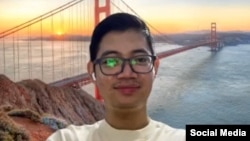The brother of a prominent Cambodian activist has been arrested by local authorities, according to the activist and a Thai human rights group.
Hay Vannith, a Cambodian scholar, was arrested and detained at the Poi Pet border in northwestern Cambodia after trying to travel to Thailand, Hay Vanna told VOA.
Hay Vanna, a Cambodian political activist who lives in Japan, said Vannith was detained Friday.
“My brother has nothing to do with my political advocacy,’’ he told VOA on Monday night. ‘’He’s a scholar, public servant and a professor at National Institute of Public Health. I call for his immediate release. It’s more than 48 hours since we lost contact on August 16.”
Vannith, 28, studied in the U.S. as a Fulbright scholar and as a graduate student at the Food Science Institute at Kansas State University. He works as a civil servant at the Ministry of Health in Cambodia.
The Bangkok-based human rights group Manushya Foundation also reported the detention.
Hay Vanna is the Japan director for the Cambodia National Rescue Movement, whose supporters include former members of the banned Cambodia National Rescue Party. The party, often known as the CNRP, was declared illegal in 2017 by Cambodia’s Supreme Court after it was convicted of conspiring to overthrow the government. It had been the sole credible challenger to the ruling CPP in the 2013 national elections and had performed better-than-expected in 2017 local elections, before being removed from electoral politics.
Vanna has continued to work for the Cambodia National Recue Movement in Japan. His overseas activities caught the attention of Cambodian authorities.
In remarks broadcast on state TV on July 23, former Prime Minister Hun Sen, who ruled Cambodia for nearly 40 years until last year, warned Vanna over his advocacy.
“After posting a message on my social media, this person by the name of Hay Vanna who lives in Japan, commented on the so-called ceasing of the four Cambodian provinces to others,’’ Hun Sen said. ‘’I didn’t respond. Instead, I blocked him right away. But you shouldn’t be confused that you have family members here in Cambodia. And they, who are living here, must not be arrogant. After hearing his message ... You must stop, or else.”
Hun Sen’s comments were in connection to the Cambodian-Laos-Vietnam Development Triangle, a project that promotes economic trade, but activists have voiced criticism, asserting Cambodia risks ceding land to Vietnam.
Fearing reprisal, this prompted Vanna’s family to leave Cambodia in early August.
“My entire [family] escaped Cambodia on August 4. Arrived in Japan on August 5. [My brother] intended to leave on August 16, [but] got caught,” Vanna told VOA.
Vanna said he remains in contact with the Cambodian authorities over his brother’s detention. A photo of Hay Vannith in detention and his arrest record documents have been seen by VOA.
Vanna Hay says the authorities are accusing Vannith of trying to “overthrow the government.”
“He is forced to provide untrue information,” Vanna said. “I call on the Hun Sen and Hun Manet authoritarian regime to be more mature and dare to play politics with me directly, not my siblings. He is innocent.”
Emilie Palamy Pradichit, the founder of Manuysha Foundation, condemned the detention, saying Vannith was “unjustly targeted.”
“We strongly condemn the arbitrary detention of Vannith Hay by Cambodian authorities,’’ she told VOA. ‘’He is being unjustly targeted simply because of his brother’s courageous advocacy for democracy.”
“The arbitrary detention of Vannith Hay violates Cambodia’s commitments under international law and its duty to uphold the rights to liberty, security, and freedom from discrimination. We call for the immediate release of Vannith Hay and urge authorities to cease using family members as pawns in their attempts to silence dissent.”
The Cambodian People’s Party (CPP) has dominated Cambodian politics for more than 40 years. Dissidents, outspoken critics and political rivals to the CPP regularly have encountered trouble with the law and legal system.
Both the Cambodia National Rescue Party (CNRP) and the Candlelight Party have been banned from running in elections in the past decade, while political figures have been targeted.
In March 2023, Cambodia jailed former CNRP leader Kem Sokha for 27 years on charges he had faced for years, that he conspired with foreign powers to overthrow the Cambodian government.
Hun Manet, Hun Sen’s eldest son, succeeded his father as prime minister almost one year ago.
Additionally, on Sunday, at least 20 political and human right activists were arrested in Phnom Penh after protests had been planned to oppose the Cambodia-Laos-Vietnam Development Triangle project, according to local media.
Cambodia’s Ministry of National Defence spokesman Chhum Socheat said the arrests marked “another defeat” against “extremist opposition groups overseas” who attempt to “overthrow the government by non-democratic means.”
Cambodia’s Prime Minister Hun Manet insists no Cambodian territory will be lost in the three-nation development initiative, Radio Free Asia reported.
Protests against the project took place in South Korea, Canada and Australia on August 11. Vanna organized a rally in Japan, attracting some 700 people, he said.
Phil Robertson, the Director for Asia Human Rights and Labour Advocates, says the Cambodian government is “paranoid” and using any suspicions to conduct a broad crackdown on dissidents.
“The government's paranoia and mistrust of the Cambodian people was on full display on Sunday as scores of police manned checkpoints and conducted arrests on civil society groups, opposition politicians and anyone else who came under the security forces' suspicious eye,” Robertson told VOA.
“To justify all this, PM Hun Manet and his administration are manufacturing the fictional, so-called "color revolution" narrative again as the bogeyman to justify any sorts of human rights violations they commit as part of this broad crackdown. The people and the country are worse off because of it,” Robertson added.
VOA has requested comment from the Cambodian government but have yet to receive a reply.




